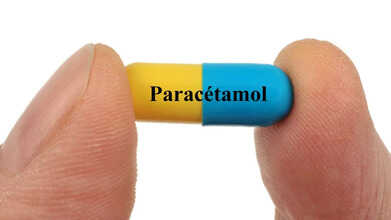- Health Conditions A-Z
- Health & Wellness
- Nutrition
- Fitness
- Health News
- Ayurveda
- Videos
- Medicine A-Z
- Parenting
- Web Stories
Woman Lost 4 Stone Weight On Mounjaro, But These Horrific Side Effects Ruined Her Life

Credits: TikTok/zayreeshh
Zari, a mother and social media influencer, hit the headlines after detailing her terrible ordeal with weight-loss injection Mounjaro. Having previously worn UK sizes 18 to 20, she was overjoyed to lose four stone in four months. However, what had started out as one of transformation soon went horribly wrong and turned into a series of medical crises and constant agony, leaving her "in and out" of hospitals.
In a real TikTok clip, Zari disclosed that she now has gastritis, a painful stomach lining inflammation, which she never had prior to taking the medication. "As much as I love Mounjaro, I can hands down say it has ruined a part of me," she captioned her clip, highlighting the long-term effect on her health regardless of weight loss.
Gastritis presents as abdominal cramps, nausea, vomiting, belching, and gas. With Zari, the symptoms were sudden and severe, prompting repeated visits to hospital and copious blood work. Physicians diagnosed her symptoms as inflammation of the stomach lining, possibly due to Mounjaro usage.
As stated by the NHS, gastritis can be caused by Helicobacter pylori bacterial infections, anti-inflammatory pain medication, excessive drinking of alcohol, and extreme stress levels. These are usual causes; however, drugs such as Mounjaro, which manipulate the gastrointestinal tract, can induce serious instances in some people.

Mounjaro, which was sanctioned for individuals with a BMI of more than 30 or for individuals with BMI greater than 27 accompanied by weight-related health problems, is revered for its efficacy in swift weight loss. Zari shed four stone within a space of four months—a great feat for anyone with obesity.
Yet the cost of rapid transformation can sometimes outweigh the benefits. Zari admitted, “I look trash because I’m tired from the pain the whole night—Mounjaro has given me gastritis, and that is a killer.” She highlighted how even simple day-to-day activities are impacted, with pain interfering with her ability to eat, sleep, and function normally, reports The Mirror.

The most frequent side effects of Mounjaro are gastrointestinal. What this patient has experienced, although not the most frequent result, is within the known risk profile of the drug.

Mounjaro side effects, as stated by the NHS, most commonly include nausea, diarrhea, constipation, and indigestion that tend to decrease with time. Yet more dangerous side effects are reported, such as low blood sugar, gallstones, and pancreatitis. Severe gastritis, although less common, fits these documented gastrointestinal complications.
The Risks of Uncontrolled Use of Weight Loss Medications
Though Mounjaro is licensed to certain medical standards, some have used the drug privately without prescription or medical necessity. The situation leaves many questioning unnecessary exposure to the potentially dangerous side effects.
Medical professionals warn that the use of weight-reducing medication without proper medical scrutiny tends to increase health risks. Dr Curtis stressed the need for consultation with medical experts prior to beginning such medication, particularly for people with no underlying obesity conditions.
For Zari, the experience is a cautionary tale about the emotional and physical costs of rapid weight loss. Despite achieving a body transformation she previously desired, the physical toll has overshadowed her accomplishments. “It’s been two months, I’ve been going in and out of hospitals, getting drips and everything,” she explained.
The case highlights a broader societal trend: the increasing demand for injectable weight-reduction treatments such as Mounjaro, driven by social media exposure and culture of instant transformation, at times without adequate awareness of risks.
A representative from Lilly UK spoke with The Mirror, saying, "Patient safety is the number one concern for Lilly, and we take very seriously any information related to patient safety. Regulatory authorities independently review the benefits and risks of each new medication very thoroughly. Patients are urged to speak with their physician about any potential side effects and to verify that they receive authentic Lilly medicine."
This statement reflects the industry’s awareness of side effects and underscores the necessity of medically supervised use of prescription weight-loss treatments.
What Patients Must Consider Before Taking Weight-Loss Injections?
Zari’s experience emphasizes several key considerations for anyone contemplating injectable weight-loss therapies:
Medical oversight is crucial: Drugs like Mounjaro are approved for specific BMI categories and comorbidities; off-label use increases risk.
Recognition of gastrointestinal side effects: Severe pain, gastritis, and nausea, although rare, are possible.
Monitoring and follow-up: Ongoing assessment by health professionals allows for early identification of complications.
Physical and mental well-being balance: The speed of weight loss may not be worth enduring chronic pain or decreased quality of life.
Is Social Media Adding To The Weight Loss Pressure?
Platforms like TikTok amplify the visibility of “miracle” weight-loss stories, often glossing over potential side effects. Zari’s transparent account offers a critical counter-narrative, highlighting the risks that might not be widely discussed, the emotional distress, hospital visits, and daily disruption that severe side effects can bring.
As more individuals turn to weight-loss injections, healthcare providers and patients alike must weigh short-term aesthetic gains against long-term health consequences. Zari’s story is a stark reminder that the pursuit of rapid weight loss can come with unforeseen and life-altering costs.
Zari’s journey from celebrating a four-stone reduction to grappling with chronic gastritis—illustrates the complexities of medically supervised weight loss. Mounjaro remains an effective tool for many, but her experience underscores the importance of understanding potential side effects, adhering to medical guidance, and prioritizing overall health above aesthetic goals.
Paracetamol Should Not Be Mixed With These Medications, Doctors Advise

Credits: Canva
The NHS has issued a warning for anyone using a common painkiller, highlighting possible harmful interactions with other medications. Across the UK, many people turn to over-the-counter medicines for daily aches, colds, and minor illnesses. Among these, paracetamol is one of the most widely used, often taken for headaches, back pain, and cold symptoms. But, like any medication, it carries certain risks.
Who Should Be Careful?
The NHS has provided guidance on using paracetamol safely, including which drug combinations should be avoided. “Paracetamol is not suitable for some people,” the health body explains. This includes individuals who take warfarin, a drug that prevents blood clots. If you are on warfarin, you should check with your GP before taking paracetamol, the NHS advises. “Paracetamol can raise the risk of bleeding in those who regularly take warfarin.”
Safe Dosing Guidelines
Small doses of paracetamol alongside warfarin are generally considered safe. The NHS adds: “It’s safe to take paracetamol if you’re on warfarin. Stick to the lowest dose that relieves your pain. Exceeding four 500mg tablets in 24 hours for more than a few days can slow your blood clotting, putting you at risk of bleeding.”
Avoid Double Dosing
Combining paracetamol with other medicines containing the same ingredient—like co-codamol or some cold and flu remedies—can be risky due to the danger of overdose. Other common painkillers, such as ibuprofen, aspirin, or codeine, do not contain paracetamol and can safely be taken at the same time.
Check with Your Doctor
The NHS advises consulting a doctor before taking paracetamol if you’re on medications for epilepsy or tuberculosis (TB), as these combinations can also pose risks.
Herbal Remedies and Supplements
Generally, paracetamol is not affected by herbal supplements, though the NHS notes: “There isn’t enough information to say whether herbal remedies, complementary medicines, or supplements are safe with paracetamol. They are not tested the same way as prescription or pharmacy medications and may interact differently.” Patients should inform their doctor or pharmacist about any other medicines or supplements they are taking.
Side Effects of Paracetamol
When taken at the recommended dose, paracetamol “very rarely” causes side effects. For a full list, refer to the information leaflet inside the packaging.
Serious Allergic Reactions
In rare cases, a serious allergic reaction (anaphylaxis) can occur. The NHS advises calling 999 immediately if you notice:
- Swelling of lips, mouth, throat, or tongue
- Rapid or labored breathing, wheezing, or a choking sensation
- A tight throat or difficulty swallowing
- Skin, lips, or tongue turning blue, grey, or pale (on darker skin, check palms or soles)
- Sudden confusion, extreme drowsiness, or dizziness
- Fainting and unresponsiveness
- A child appearing limp, floppy, or unresponsive, with difficulty lifting or focusing their head
Do You Zone Out Often? Study Finds This May Be A Way For Your Brain Do 'Maintenance'

(Credit-Canva)
That sudden, foggy feeling where you can't focus, especially when you're super tired? New research suggests that these moments of zoning out are actually your brain's last-ditch effort to do the important cleaning it normally saves for when you're fast asleep. Your brain is trying to take a quick, emergency break.
We have all had days when focusing seems too difficult and you keep ‘spacing out’. When this happens, you take a moment to regain your composure and get back to what you were doing. While you may think that it is a simple lapse in attention, there is a lot that happens in your brain during this time.
The research, published in the Nature Neuroscience, shows this is the time your brain does its ‘maintenance work’ to ensure maximum functionality.
Why Do We Zone Out?
Scientists at MIT used special scanners to look deep inside the brain while people were trying to concentrate. They discovered that the exact moment someone zoned out, a wave of cerebrospinal fluid (CSF), a clear fluid that surrounds the brain, whooshed out, and then flowed right back in. This movement of fluid looks exactly like the process that happens during deep sleep, when the fluid washes away built-up waste and toxins from the day. When you're awake and tired, your brain is trying to force this cleaning process to happen.
How Does Our Brain Keep Functioning Fluidly?
A leading neuroscientist from the study explained that if you skip sleep, these cleaning waves start happening while you're awake, even though they shouldn't. The problem is that while the fluid is flowing and cleaning, you lose your ability to pay attention. It's a trade-off: your brain tries to clean up, but the price is that you can't focus on what you're doing. It’s almost like your brain is desperately trying to squeeze in a tiny bit of "microsleep" maintenance, which steals your focus.
The researchers had people do tests in the lab twice: once after they were well-rested, and once after they stayed up all night. Unsurprisingly, people performed much worse when they hadn't slept. Critically, the zoning out happened far more often after the all-nighter. When they looked at the brain data, they saw a clear pattern: when people's reaction times slowed down (meaning they were zoning out), the big fluid cleaning waves were always present. This strongly suggests your tired brain is trying to use these quick cycles to restore function, even if it makes you temporarily lose focus.
How Do We Know When We Zone Out?
The research revealed that when people zoned out, not only did the brain fluid move, but other things changed, too. Their breathing and heart rate slowed down, and their pupils got smaller. This makes the scientists suspect that a single, powerful "master switch" in the body controls both your high-level functions (like attention and perception) and these automatic, basic physical processes (like fluid movement and heart rate). The finding suggests that a lack of sleep affects your whole body through one central system.
Your Daily Work 'Grind' Is Ruining Your Heart Health, Cardiologist Explains How These Daily Habits Affect Your Heart

(Credit-Canva)
Recently, we are seeing a rise in ‘grind culture’. People are encouraged to pack their days with work and be as productive as possible to secure future success. However, did you know that chasing this success could come at the cost of your heart's health? Dr. Dmitry Yaranov, MD, a cardiologist, who often shared important health advice and knowledge on Instagram videos, explained posted about how as a practicing healthcare professional, there are many heart facts that he wished his patients knew about.
Things we often perceive as important for our careers can come at the cost of our mental and physical health. By not realizing the value of their health and ignoring their limits, people often stretch themselves too far, which can result in reaching a breaking point.
In a recent video posted with the text, “After treating thousands of patients with heart failure this are the things I wish more people knew before it was too late” in the caption he listed 6 hard facts that most people ignore.
6 Habits That Are Leading You To Heart Failure
In the caption Dr. Yaranov explained that cardiovascular health involves much more than just hitting the gym and eating salads. Your heart health is fundamentally tied to sleep, stress management, environmental factors, access to resources, and even the state of your gut. Fix the foundation, not just the numbers.
Sleep Deprivation is Dangerous
Sleeping only six hours nightly and pushing yourself is a serious threat, not a badge of honor. This chronic sleep loss significantly raises your long-term risk of developing severe conditions like heart failure, having a stroke, or experiencing sudden cardiac death. Your body needs rest to recover.
Air Quality Hardens Arteries
Commuting daily in heavy traffic means breathing exhaust and particulate matter. This consistent exposure to air pollution does more than irritate your lungs; scientific studies confirm it literally hardens your arteries, increasing your risk for major cardiac events over time.
Stress Causes Overload
If you are always stressed and simply "pushing through" without managing the pressure, your body is producing too much cortisol. This hormonal overload leads to persistent high blood pressure and widespread inflammation, key factors that severely damage the cardiovascular system.
Gum Health Impacts Heart Health
Ignoring routine dental care and having gum disease creates chronic infection in your mouth. This persistent gum disease results in more body-wide inflammation, which is directly linked to a significantly higher risk of heart attack and other cardiovascular problems.
Food Access Matters
Even if you have the best intentions to eat well, living where healthy food is hard to find (a food desert) makes it difficult. This lack of access to nutritious options leads to worse cardiac outcomes, proving that environment, not just personal willpower, shapes your health.
Gut Health Affects Vital Signs
The state of your digestive system should not be ignored. The millions of bacteria in your gut microbiome play a critical, unrecognized role in helping your body regulate blood pressure and cholesterol levels. You must consciously feed your gut bacteria the right way.
© 2024 Bennett, Coleman & Company Limited

